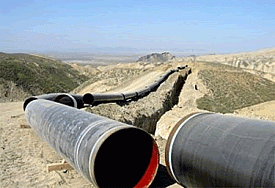SINGAPORE -- Ask Western elites -- oh, those were the days, in the 17th century, when the rise of European sea powers led to the collapse of the caravan trade and the end of the Silk Road as Europe found a cheaper -- and safer -- way of trading between East and West.
Now, centuries after Tang armies establishing nodes all over Central Asia as far as Khorasan in northeast Iran, the 21st century Silk Road(s) are back. The camels now wear iPads, with the Persian Gulf as a high-tech caravanserai.
Si chou zhi lu ("Silk Road" in Mandarin). What's in a name? Trouble. A lot of trouble. At least if you ask the Pentagon, which places most of these roads -- from the Persian Gulf to Central Asia and even the South China Sea -- smack in the middle of its famous "arc of instability." In parallel, in rising Eastern latitudes, it's Dream Team time: and the name of the game is Eurasian integration.
Who's the real Iron Man in this picture? It has to be Beijing Man, expanding his economy at a dizzying pace, securing all the resources he needs -- not only oil and gas but by being the world's largest consumer of aluminum, copper, lead, nickel, zinc, tin, iron ore -- and breathlessly moving global power tectonic plates.
So no wonder Beijing is appalled by the carnage/civil war forced upon Syria by foreign actors; that's bad for business. The PRC has historically viewed Syria as a ning jiu li -- a cohesive force in the Arab world -- in many aspects the epicenter of the Arab world, and much more progressive, socially, than the Persian Gulf. And while Beijing always praised Syria's stability, the Syrian establishment had been in thrall to China's economic miracle.
When the saints go marchin' in
What we are experiencing now could be described as The Long March West (from the point of view of Beijing) versus The Short March East, as in Pivoting to Asia (from the point of view of Washington).
But it's not pivoting in the sense of the best the US has to offer -- the university-based research system absorbing talent from all over; the drive to dare, to risk, to take a second chance; that vortex of invention -- new companies, new industries, new products.
In this vast chessboard where the complex, intertwined geo-economic competition known as the New Great Game in Eurasia is being played, both kings are easy to identify: Pipelineistan, and the multiple intersections of the 21st century Silk Road. Call them the new iron and steel Silk Roads.
Across this immense Eurasian grid, speed trumps institutional politics. Nobody -- from the European Union to the Shanghai Cooperation Organization (SCO) -- is on top of all that's going on; we would need a 4D version of the pipeline map room at Gazprom's headquarters in Moscow, a Star Wars version of the London Underground map.
What we can do is set out on a lightning quick road trip. Starting with Turkey, a North Atlantic Treaty Organization and Group of 20 member -- keen to bill itself as the energy crossroads for Caspian oil, Iraqi oil, and now Kurdistan oil in northern Iraq.
Turkey has gone totally New Silk Road. Last month, it officially became a dialogue partner of the SCO. Why dream of entering a sinking EU? No. Better reinforce a political and trading partnership with Moscow and Beijing -- not to mention the Central Asian "stans."
Now that's certainly a more sound application of Foreign Minister Davotuglu's "strategic depth" than that muddled "logistical support" for regime change in Syria.
Then there's the Southeast Anatolia Project, and the Ataturk Dam -- not very far, by the way, from the Syrian border. The Euphrates river dam system -- planned in the 1970s -- is also propelling Turkey as a great power in the Arab Middle East. Inescapable, when you can divert as much as 90% of Iraq's and 40% of Syria's water power.
But only Iran can enable Turkey to fulfill its core strategic goal -- as in the prime energy crossroads from East to West -- because that would mean Turkey as the prime mover of oil and gas from Iran to Europe. If or when that happens, Turkey will be way more important than just a land bridge. Turkey and Iran may be competitors but more than ever they need to be allies.
Most of all what happens in Iran and to Iran will determine which way the wind will blow in Eurasia. Iran strategically straddles Mesopotamia, Anatolia, the Caucasus, the Caspian Sea, Central and South Asia, the Persian Gulf, and the Arabian Sea. Iran dominates the Persian Gulf -- from the Shatt al Arab to the Strait of Hormuz. Location, population, energy wealth: the absolute key to Southwest Asia. Ask Dick Cheney; no wonder for Washington this has always been the Great Prize.
Pipelineistan -- from a Western point of view -- has always carried an obsessive theme; how to bypass both Russia and Iran. So inevitably Pipelineistan explains a great deal about why Syria is being destroyed. Take the agreement for the US$10 billion Iran-Iraq-Syria gas pipeline that was signed in July 2012. This crucial Pipelineistan node will export gas from the South Pars field in Iran (the largest in the world, shared with Qatar), through Iraq, towards Syria, with a possible extension to Lebanon, with certified customers in Western Europe. It's what our friends in Beijing describe as a "win-win" situation.
(Note: You can view every article as one long page if you sign up as an Advocate Member, or higher).






